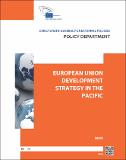Files in this item
European Union development strategy in the Pacific
Item metadata
| dc.contributor.author | Borrevik, Camilla | |
| dc.contributor.author | Crook, Tony | |
| dc.contributor.author | Hviding, Edvard | |
| dc.contributor.author | Lind, Craig Thomas | |
| dc.date.accessioned | 2017-01-19T09:30:16Z | |
| dc.date.available | 2017-01-19T09:30:16Z | |
| dc.date.issued | 2014-07-29 | |
| dc.identifier | 248900633 | |
| dc.identifier | fdff2267-c576-4571-9312-a7e3b7266a85 | |
| dc.identifier.citation | Borrevik , C , Crook , T , Hviding , E & Lind , C T 2014 , European Union development strategy in the Pacific . vol. EXPO/B/DEVE/2013/29 , PE 534.976 edn , European Union, Directorate-General for External Policies of the Union , Brussels . https://doi.org/10.2861/6397 | en |
| dc.identifier.isbn | 978-92-823-5763-7 | |
| dc.identifier.other | ORCID: /0000-0002-2387-1699/work/36441535 | |
| dc.identifier.uri | https://hdl.handle.net/10023/10125 | |
| dc.description | Study Report for the European Parliament Development Committee, undertaken by ECOPAS (European Consortium for Pacific Studies). | en |
| dc.description.abstract | Development in the Pacific region is uneven, multi-layered and challenging. The European Union’s development cooperation with the Pacific is significant; in fact the EU is the second largest donor of development assistance to the region. This study, implemented by the European Consortium for Pacific Studies, analyses the current and future contexts for European Union engagement in development cooperation with the Pacific, and proposes elements of a renewed EU development strategy for the region. From a Pacific perspective, the question of defining a new EU development strategy is as much a matter of defining new and equal partnerships through which Pacific development strategies can be supported. Rising to the challenge of re-imagining EU-Pacific relations will require a good deal of work and reflection. The Pacific clearly constitutes a geopolitical context whose importance is markedly set to grow in significance, and there is a clear rationale for the EU to commit further resources to support its interests and activities in the region. In particular, the EU should enhance and deepen its institutional knowledge and means of drawing upon existing expertise on ‘Pacific Ways’. | |
| dc.format.extent | 45 | |
| dc.format.extent | 1231341 | |
| dc.language.iso | eng | |
| dc.publisher | European Union, Directorate-General for External Policies of the Union | |
| dc.subject | Foreign policy | en |
| dc.subject | Regional development | en |
| dc.subject | International negotiations, | en |
| dc.subject | Cooperation policy | en |
| dc.subject | International relations | en |
| dc.subject | 442821 | en |
| dc.subject | Countries of the Pacific Community | en |
| dc.subject | JZ International relations | en |
| dc.subject.lcc | JZ | en |
| dc.title | European Union development strategy in the Pacific | en |
| dc.type | Report | en |
| dc.contributor.institution | University of St Andrews. Social Anthropology | en |
| dc.contributor.institution | University of St Andrews. St Andrews Sustainability Institute | en |
| dc.contributor.institution | University of St Andrews. Centre for Pacific Studies | en |
| dc.identifier.doi | https://doi.org/10.2861/6397 | |
| dc.identifier.url | https://ec.europa.eu/research/social-sciences/pdf/deve-eu_pacific_study_en_2014-06-30.pdf | en |
This item appears in the following Collection(s)
Items in the St Andrews Research Repository are protected by copyright, with all rights reserved, unless otherwise indicated.

